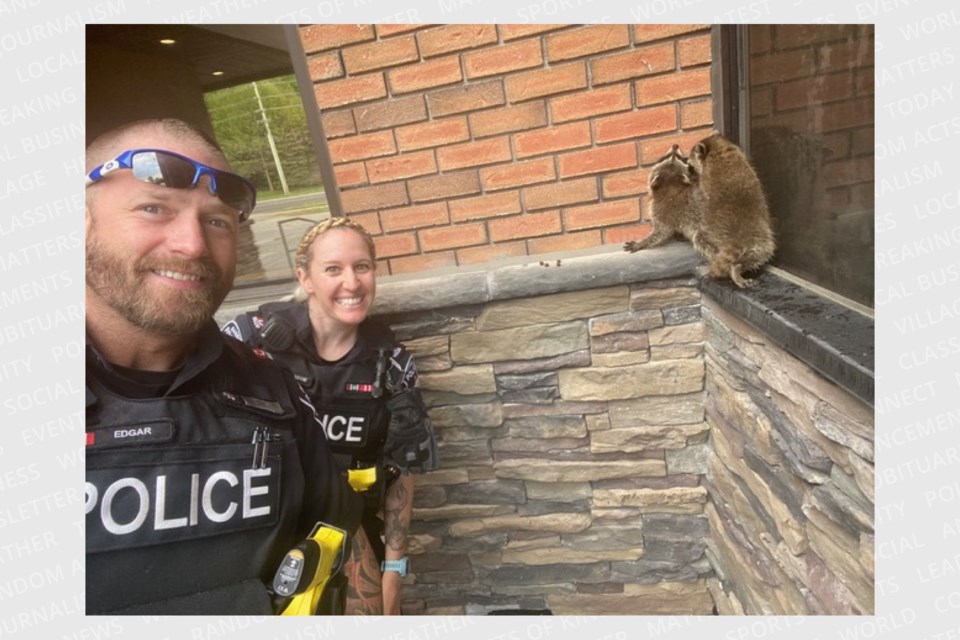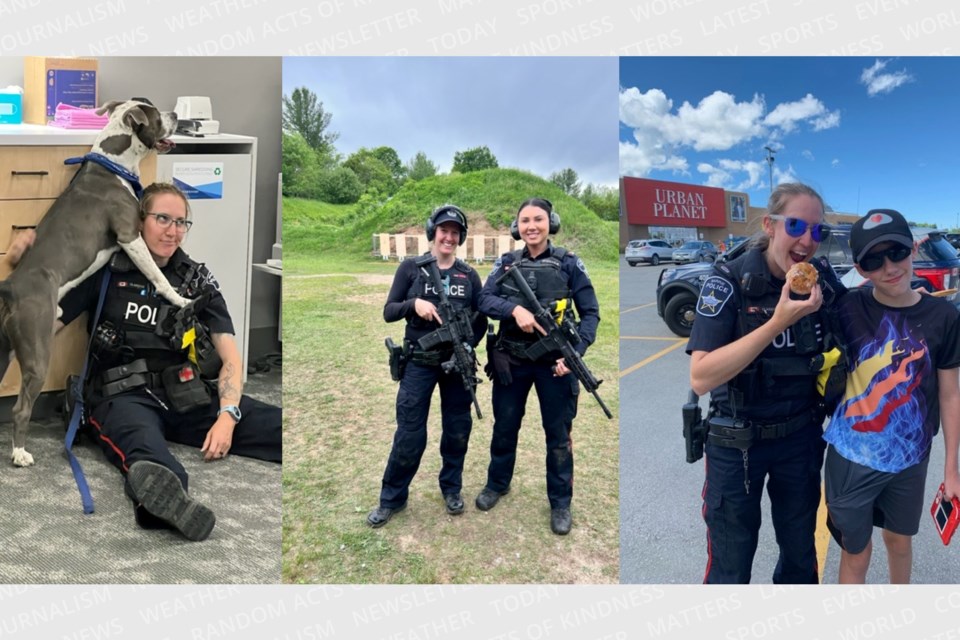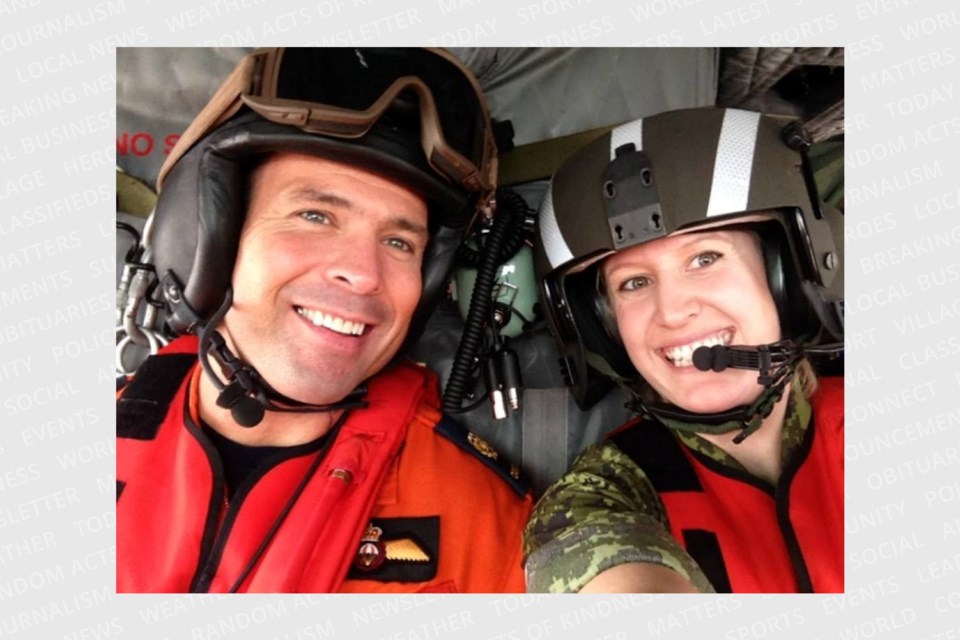What started off as an “impulsive decision” by a rash teenager ultimately turned into a 14-year career that taught Elise Claridge more about herself than she could ever have imagined.
Claridge, now a five-year uniformed frontline officer with the Barrie Police Service, was only 17 when she made the decision to join the Canadian Armed Forces. She says a recruiter showed up at her Richmond Hill high school and she simply thought it was a “neat idea."
Her decision was not one that many expected from her, especially one from a family with more liberal values, she admits, adding her parents — both school principals — thought it was just a phase and that, like many impulsive teenage decisions, she would eventually move on to something else.
“I didn’t have a lot of purpose at that time. Both of my grandfathers had served, so I had known family service … but it was really just to do something that none of my friends were doing and that I felt I could be proud of,” said.
One of Claridge’s grandfathers had been part of the infantry and contributed to the liberation of Holland from Nazi occupation, while her Zaida (Hebrew for grandfather) was stationed in England, working as a clerk in the air force.
“Unfortunately, I never had the chance to ask them about their time in the Canadian Forces, as, like many veterans, they rarely spoke of it,” says Claridge, now 35.
Being half-Jewish, the events of the Second World War carried a deeper personal significance for Claridge and her family.
“Growing up, I had always admired those who served, like my grandfathers, to save lives and combat evil. By the age of 17, in the mid-2000s, Canada's involvement in Afghanistan was still relatively new. I believed that if I wanted to follow in my grandfathers' footsteps and contribute to the effort of stopping evil, this was the time," she adds.

Claridge initially joined as a reservist, where she worked as a mobile support equipment operator — aka a driver.
“It was a simple, not very glamorous lifestyle, but it did allow me to do a lot of unique tasks and travel across the country and the continent," she says. "I did a stint with the Special Forces, and then my deployment in Afghanistan (in 2010) was under that umbrella as well.
"It wasn’t until after that I took up the mantle of being a medic, so then I went into a medical branch.”
At only 23 years old, Claridge was deployed to Afghanistan, where she initially served delivering supplies between the various forward operating bases and camps across Kandahar province.
Over time, her role grew and changed. Claridge began focusing more on security aspects with interpreting and liaison skills with the locals.
It’s been 13 years since she began her deployment in Afghanistan, and even though she left there with a sense of pride, the word that comes to mind these days is often “cynical.”
“Initially, I was naive and impressionable. You look at the world with rose-coloured glasses and you want to believe the best in humanity. When I got there and experienced it first hand, I still left with a sense of pride, but I think all of that … has really shattered, given we basically gave it back a couple of years ago.
"All of that good, positive feeling has turned to cynicism.”
That being said, Claridge recalls a conversation she had once with a young woman who had managed to escape from the war as a child.
“She was in Kabul ... and said what the coalition forces did was give the country a couple decades of stability and in that time of stability, they were able to get out of the country. That wouldn’t have been possible (otherwise). That’s something I have held onto ... that the time we had there was enough to get good people out.
“Did I want to go to Afghanistan at that time? Honestly, no. Coming from a liberal home where my parents initially didn't support the idea of their youngest daughter running off to join the army and being unconvinced about the purpose of our presence there, my focus within the military was humanitarian relief and disaster response,” Claridge says.
However, with more friends returning from the war with stories of resilience and fortitude, she made the decision to be part of the mission, a decision she says she initially kept to herself.
“I didn't inform my family immediately, knowing their reservations about Canada's involvement in Afghanistan. I told them I was going to fight forest fires in British Columbia, revealing my true destination only a month before my departure," she says.
"While they couldn't stop me, they weren't thrilled with my choice, but they did support me. Despite their disagreement with Canada's presence in Afghanistan, they believed in their daughter's good intentions to bring about a positive impact.”
Living on Kandahar Air Base, Claridge remembers all too clearly how the entire camp would come together on the airfield every time a coalition soldier was killed for a “ramp ceremony.”
“The fallen soldiers' bodies would be led through the ranks and loaded into an aircraft bound for home. I lost count of how many ramp ceremonies I attended," she says. "To this day, the sound of The Last Post and Amazing Grace transports me back to that airfield, watching the bodies of my colleagues being walked down the single row, feeling the searing heat of the tarmac on my feet and face while those around me wept."
After returning from Afghanistan, Claridge decided to specialize in the medical sector. Her time there had given her unique insight into combat medicine, she says, which inspired her to dedicate the rest of her career to the field.
Thanks to the military's educational benefits, she was able to obtain a civilian paramedicine diploma, and spent the next couple of years working to advance in the medical field, specializing in nuclear, biological and chemical medicine, as well as high-altitude and mountain operations medicine.
That journey eventually led her to CFB Trenton, where she spent the last six years of her military career treating soldiers on the air base while deploying as a medic with units like the Skyhawks, Pathfinders and the Mountain Guides of the Advanced Warfare Centre.
Claridge was even selected to represent Canada in the Starlight Challenge – a unique medical competition that took her to Europe where she and her team competed against other countries in combat medical skills and scenarios.

Now, looking back at that rash 17-year-old version of herself, Claridge acknowledges she was likely pretty naive at that time, adding that deep down her decision to join the military was a way of continuing the legacy of her family.
That said, the reality of military life was a stark contrast to brightly coloured images painted by recruitment posters and seen in movies and television, she says.
“When you’re a teenager and you join the military, you have this idea of what war would be like, and your only telling of that is coming from Hollywood. You expect it to be this experience of devout camaraderie and greatness and hardships," Claridge says. "There were hardships to be had and challenges — and great experiences — but not embellished the way it is.
“A significant portion of my early military experience was spent asking myself, what have I done and (being) way too stubborn to quit and move on as was expected by my friends and family. At 17, my naive desire was to jump into active duty, participate in humanitarian work worldwide, shoot guns and be an everyday bad ass.”
Claridge says as much as she loved her time in the army, the constant travel and several years of living apart from her new husband, who was based in Ottawa, forced her to make the difficult decision to retire from the military.
She had initially wanted to become a doctor, but ultimately opted for career in policing.
“Policing to me, even though I was kind of on the path to becoming a doctor at that point, I thought if I can’t be a doctor right now what about a police canine handler … again my naive, impulsiveness even at 29 kicked in,” she says with a laugh.
“I always say the grass isn’t greener, it’s just a different pasture. It’s definitely different."
Claridge says policing has allowed her to apply the views and experiences gained during her military service to everyday tasks in domestic roles.
“Every police officer, I believe, offers a unique perspective shaped by their life experiences. Coming from an advanced combat medical role, I knew I was ready to handle stress and trauma,” she says.
That readiness has been tested on many occasions while dealing with violent crimes, Claridge adds. But policing has also provided her the opportunity to continue serving the community and fellow Canadians.
“Policing has opened my eyes to the realization that evil isn't confined to foreign lands; it exists within our home cities. One doesn't need to go to war to witness this truth and like the Taliban disappearing back into the population, evil within Canada can hide in plain sight. It just requires a trained eye to see it," she says.
Claridge says she’s extremely proud of the legacy she left behind from her time as a member of the Canadian Armed Forces, and had plans to join in the annual Remembrance Day service in downtown Barrie today to honour not only her own service, but that of her fellow soldiers young and old. And, of course, both of her grandfathers.
“We don’t want to repeat the mistakes of our past, but history says we are always doomed to do so. We want to honour those who have given the ultimate sacrifice for what they believed at the time was a greaterness. That is all we can do,” she says
